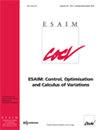对风险敏感的大型和小型游戏
IF 1.2
3区 数学
Q4 AUTOMATION & CONTROL SYSTEMS
Esaim-Control Optimisation and Calculus of Variations
Pub Date : 2022-12-02
DOI:10.1051/cocv/2022082
引用次数: 1
摘要
我们研究了一类包含大量主要和次要参与者的平均场博弈。每个参与者最小化一个二次跟踪型风险敏感成本函数,其中参考信号是主要参与者和次要参与者的状态平均项的函数。为了降低问题求解的复杂性,我们利用纳什确定性等价原理设计了一系列分散策略。首先,针对二次型风险敏感代价函数的最优控制问题,提出了一个新的验证定理。其次,利用两层状态聚合方法构造了状态平均项估计的不动点方程,并给出了不动点的存在唯一性条件;然后,基于局部信息,通过估计状态平均项,设计了一系列分散策略。结果表明,对于闭环系统,状态平均项的估计与真值一致,所设计的策略序列是一个分散的渐近纳什均衡。最后,通过数值算例验证了理论分析的有效性。本文章由计算机程序翻译,如有差异,请以英文原文为准。
Risk-sensitive mean field games with major and minor players
We investigate a class of mean field games containing a large number of major and minor players. Each player minimizes a quadratic-tracking type risk-sensitive cost functional, where the reference signal is a function of the state average term of the major and minor players. To reduce the complexity for solving the problem, we design a sequence of decentralized strategies by the Nash certainty equivalence principle. Firstly, for the optimal control problems with quadratic type risksensitive cost functionals, we propose a new verification theorem. Secondly, we apply the two-layer state aggregation method to construct the fixed-point equations for the estimations of the state average terms and give the conditions for the existence and uniqueness of the fixed points. Then, we design a sequence of decentralized strategies by the estimations of the state average terms based on local information. It is shown that the estimations of the state average terms are consistent with the true values for the closed-loop systems, and the sequence of strategies designed is a decentralized asymptotic Nash equilibrium. Finally, the effectiveness of the theoretical analysis is demonstrated by a numerical example.
求助全文
通过发布文献求助,成功后即可免费获取论文全文。
去求助
来源期刊

Esaim-Control Optimisation and Calculus of Variations
Mathematics-Computational Mathematics
自引率
7.10%
发文量
77
期刊介绍:
ESAIM: COCV strives to publish rapidly and efficiently papers and surveys in the areas of Control, Optimisation and Calculus of Variations.
Articles may be theoretical, computational, or both, and they will cover contemporary subjects with impact in forefront technology, biosciences, materials science, computer vision, continuum physics, decision sciences and other allied disciplines.
Targeted topics include:
in control: modeling, controllability, optimal control, stabilization, control design, hybrid control, robustness analysis, numerical and computational methods for control, stochastic or deterministic, continuous or discrete control systems, finite-dimensional or infinite-dimensional control systems, geometric control, quantum control, game theory;
in optimisation: mathematical programming, large scale systems, stochastic optimisation, combinatorial optimisation, shape optimisation, convex or nonsmooth optimisation, inverse problems, interior point methods, duality methods, numerical methods, convergence and complexity, global optimisation, optimisation and dynamical systems, optimal transport, machine learning, image or signal analysis;
in calculus of variations: variational methods for differential equations and Hamiltonian systems, variational inequalities; semicontinuity and convergence, existence and regularity of minimizers and critical points of functionals, relaxation; geometric problems and the use and development of geometric measure theory tools; problems involving randomness; viscosity solutions; numerical methods; homogenization, multiscale and singular perturbation problems.
 求助内容:
求助内容: 应助结果提醒方式:
应助结果提醒方式:


